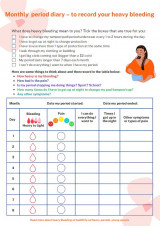Heavy periods for young people
Heavy menstrual periods are also called menorrhagia
Key points about heavy periods for young people
- Heavy periods are when you bleed more or for longer than usual, you may feel extra tired and not feel like going to school or playing sport.
- Heavy periods are common and are usually nothing to worry about.
- If your heavy periods continue for several months, talk to a nurse or doctor and get some advice. There may be things they can do that will help.
- Try not to feel embarrassed, remember that half the population has periods at some stage in their lives.
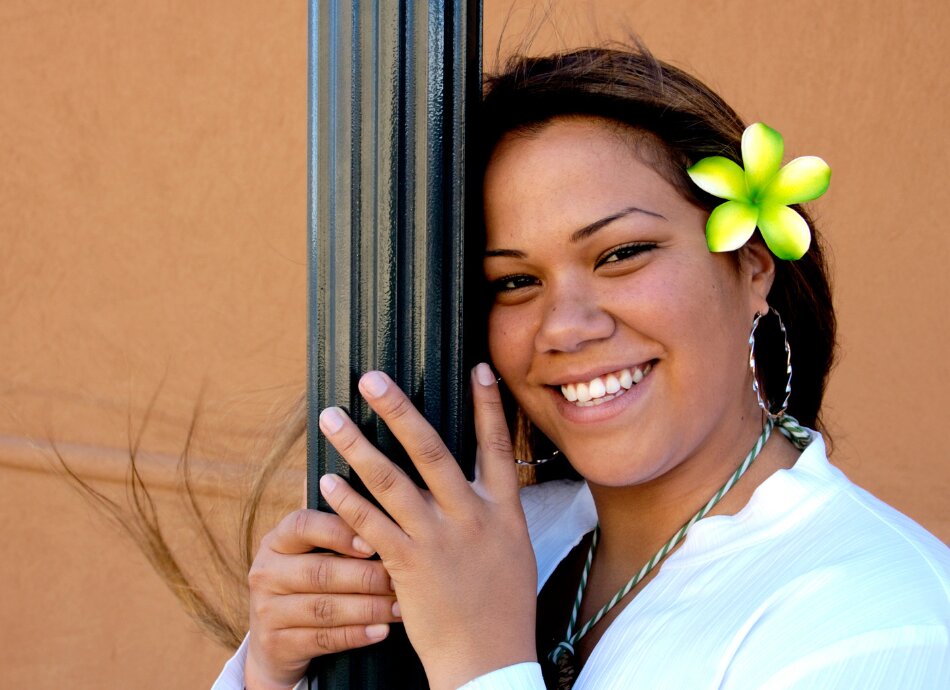
Being a young person or teenager is hard enough without having to deal with heavy periods as well. We've worked with some rangatahi to answer some of the questions you might have if you think you’re bleeding a lot when you have your period.
If you have other questions you’d like us to answer on this page, leave us a comment (see bottom of page). Here are some answers to some of the things you might be wondering (or worrying) about!
Yes, it’s absolutely OK. Our parents and grandparents probably didn’t talk much about personal things like periods – and they had far fewer options for dealing with them. But times have changed and it’s fine to talk to your friends, members of your whānau and health professionals (doctors and nurses). In fact it’s really important that you do talk about any questions or concerns you might have.
Remember that:
- About half of the people in the world were born with a uterus (womb).
- Almost all of them will start having periods (somewhere between the ages of 8 and 16 years), and most will keep going for about 40 years.
- That’s a lot of bleeding! So why shouldn’t we talk about it?
If you have a uterus you can expect to start having periods (menstruating) when you’re 8 to 16 years of age, about 2 years after breasts start to grow. The most common age is between 10 and 13 years. Periods are often not regular when they start – you might have a very light one and miss a few months before you get a second one. Or, you might get into a regular pattern of days of bleeding and days not bleeding quite quickly. This is called your menstrual cycle. It can take a few years to settle into a regular cycle and some people never do.
Periods usually happen about once a month but your cycle may not be 28 days, it might be less or more than this.
After you’ve had a period, hormones cause your uterus to grow a lining (endometrium). You ovulate once during your cycle, this is when 1 of your ovaries releases an egg that can be fertilised if you’re sexually active. If there’s no fertilised egg, the lining of your uterus breaks down and comes out through your cervix and vagina. That’s when you have a period.
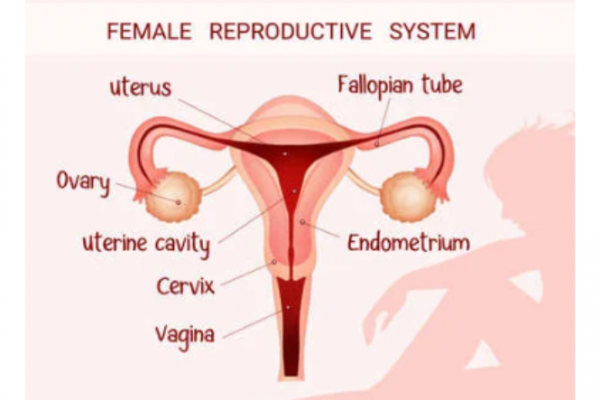
Image credit: 123rf
Video: Menstruation – what to expect
If you need more information about what periods are all about, here's a video you can watch.
It may seem like your friends are just getting on with their lives when they have their period when you feel like you can’t. Although it’s good to talk to them about what’s happening for you, and hear about ways they might be managing things, try not to compare how you’re coping with how they are.
- You might be having really heavy bleeding, and they’re not.
- You might have really bad cramps and feel like staying in bed and they’re going for a run!
- You might feel really emotional or get upset easily and they don’t.
Everyone is different and your experiences are just that – yours!
Here are a few questions to ask yourself to see whether your periods are heavier than you could expect:
- Do you need to change your pad, tampon or period underwear every 1–2 hours, or empty your menstrual cup more often than recommended (this will depend on the brand and size you’re using)?
- Do you need to use 2 different types of protection (eg, a pad and a tampon) at the same time?
- Do you have to get up in the night to change your period protection?
- Do you leak blood through to your clothes or bedding?
- Does the blood that comes out include lumps or clots that are bigger than a 50c coin?
- Do your periods last longer than 7 days each month? Keeping a period (menstrual) diary [PDF, 102 KB] might help you keep track.
- Do you avoid some daily activities (eg, going to school or work or exercising) when you have your period?
- Do you often feel tired or short of breath?
If you’ve answered ‘yes’ to any of these, have a chat to a healthcare provider. It might be your school nurse, or your family doctor or nurse.
That might feel too scary so if you have a member of your whānau you get on well with, perhaps you could start by talking to them. They could come along with you to see a nurse or doctor and help you talk or answer questions. If you’ve kept a period diary, take it along with you so they can easily see what's been happening for you.
Talking to family members might be helpful as sometimes heavy periods run in the family and others in your whānau might be having heavy periods as well.
Here's a video about heavy periods.
Video: Heavy periods – what you need to know
This video is also available in Arabic(external link), Dari(external link), Hindi(external link), Mandarin(external link) and Vietnamese(external link).
Apps reviewed by Healthify
You may find it useful to look at some Period apps for teenagers and young people and Period tracking apps.
Yes, some of these things may help you, but you’ll just have to try different things and see what works for you.
- If you have pain, take some paracetamol for it and you might find a warm bath or shower will help. You can also put a warm hot water bottle or wheat bag on your tummy to help with cramps.
- Exercise can help, but probably nothing too energetic.
- There are lots of different period products available to deal with heavy bleeding. You may find you need more than 1 type. For example, if you use tampons, use a pad as well.
- You may find you have problems managing the flow at night – unfortunately you don’t stop bleeding just because you’re sitting or lying down. Try lots of layers – a tampon or menstrual cup with a pad and period undies. If this isn’t enough you could put an old towel under you in bed to catch any leaks. It might help to get up and change your protection during the night.
- Keeping a period diary [PDF, 102 KB] can help you track what’s happening month by month.
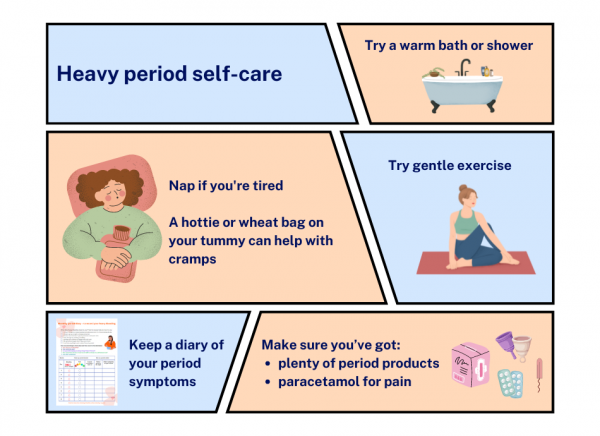
Image credit: Healthify He Puna Waiora
Find out about period products (also called sanitary products) how much they cost and the pros and cons of each(external link).
Do get some advice from a nurse or doctor if your periods don’t settle down in a few months. You might find talking about it is a relief and getting some help will let you enjoy your life more.
Not necessarily, 1 in 4 people with a uterus have heavy periods so it’s quite common. The most likely causes are:
- Your hormones – they can get out of balance and create a thicker lining in your uterus. Then, when you have your period there’s more lining to get rid of.
- Polycystic ovaries – another hormonal change that affects how your ovaries work.
- Being very overweight.
- Thyroid issues.
There may be other reasons but your doctor or nurse will check these first.
Note that having heavy periods won’t affect you having a baby when you’re ready, and it’s fine to have sex during your period, even a heavy period. It’s best to use contraception though if you don’t want to get pregnant. A condom will protect you from getting a sexually transmitted infection (STI) as well.
It’s a good idea to take a period diary [PDF, 102 KB] with you. If you keep a record of what’s been happening over a few months and take it along, you won’t have to rely on your memory. The sort of things to keep track of are:
- when your period starts and stops each month
- how heavy it is each day – you can write down how many pads/tampons/cups you had to use/change each day
- how bad the pain was
- if your bleeding stopped you doing things you wanted or needed to do
- if you had pain in other places (eg, a headache or backache) or other symptoms (eg, felt moody or really tired).
Whether or not you take along a diary, they’ll ask you some questions about your periods – just like the ones about heavy periods listed above. They may ask you to have a blood test to see if you’ve lost a lot of iron from bleeding heavily and have become anaemic.
If they can’t find an obvious reason for your heavy periods you may have other examinations and tests done – but only if they’re necessary.
It will depend on why you’ve got heavy bleeding, but often periods will get lighter on their own as your body matures and your hormones settle down. If you need treatment there are medicines you can take (eg, hormonal treatments), and iron supplements if you’re anaemic. There are also some surgery options available if needed.
But it’s important not to worry and take one step at a time!
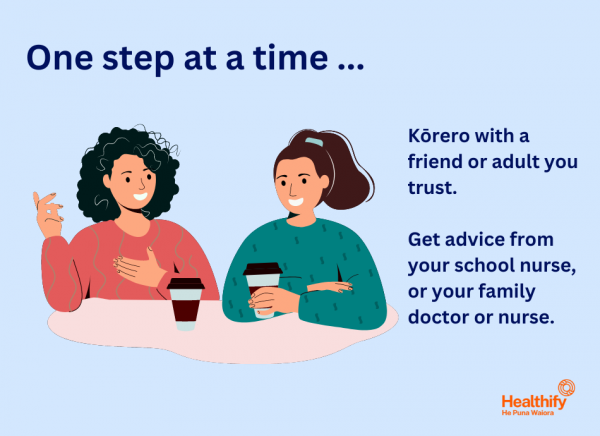
Image credit: Healthify He Puna Waiora
If I take medicines now will I always have to take them?
Not necessarily, your heavy periods may settle down as you get a bit older. There might also be some other options for you if your bleeding hasn’t settled down.
Will taking medicine affect me having babies?
No, the type of medicine you’d be prescribed for your heavy bleeding won’t stop you having a baby in the future. It also doesn’t affect how many years you’ll have your periods for. Most people with a uterus will continue to bleed monthly until they're at least 50 years of age. When you stop bleeding it’s called menopause.
You can read more about medicines for heavy bleeding and their pros and cons(external link).
Period products(external link) Sexual Wellbeing Aotearoa, NZ
Apps
Period apps for teenagers and young people
Period tracking apps
Puberty apps
Women's health apps
Brochures
Your guide to puberty, periods and products(external link) KidsCan and Nest Consulting, NZ
Period diary [PDF, 102 KB] Healthify He Puna Waiora
References
- Heavy periods(external link) NHS, UK , 2021
- Heavy bleeding(external link) Jean Hailes, Australia, 2018
- Heavy periods and bleeding in-between(external link) National Women’s Health, NZ
- Heavy menstrual bleeding(external link) RANZCOG, Australia
- Treating heavy bleeding with medication(external link) The Royal Women’s Hospital, Australia
Brochures
Credits: Healthify editorial team. Healthify is brought to you by Health Navigator Charitable Trust.
Reviewed by: Lisa Harris, registered nurse prescriber in primary health
Last reviewed:


